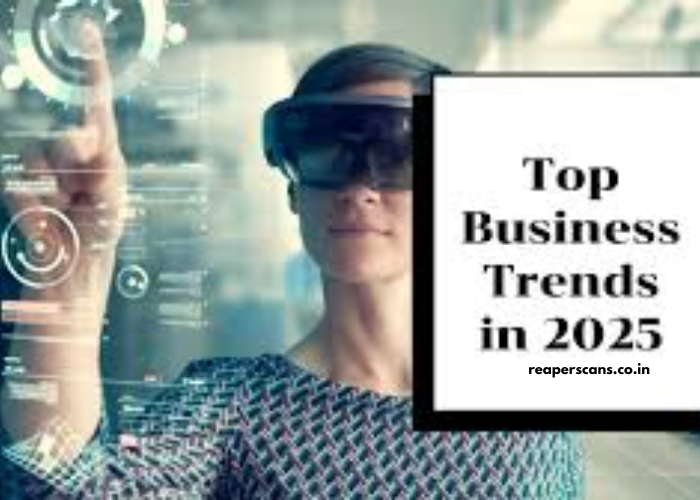In the ever-evolving world of business, staying ahead of the curve is essential for success. As we step into 2025, businesses must adapt to new technological advancements, shifting consumer behaviors, and global economic changes. To help you navigate this dynamic landscape, we’ve compiled the top business trends you need to be aware of in 2025. From AI integration to sustainability efforts, these trends will define how companies operate and compete in the coming years.
1. The Rise of Artificial Intelligence and Automation
AI and Automation: Key Drivers of Innovation
Artificial Intelligence (AI) and automation have been growing trends in recent years, but in 2025, they will reach new heights. Businesses are increasingly leveraging AI to automate routine tasks, improve decision-making, and enhance customer experiences. Whether it’s chatbots providing instant customer support, AI-powered algorithms optimizing supply chains, or predictive analytics helping companies forecast trends, AI is transforming industries across the board.
AI can also aid in decision-making by analyzing large sets of data and providing actionable insights. This empowers business leaders to make more informed, data-driven decisions that can lead to significant improvements in operational efficiency and profitability.
Enhanced Customer Experiences with AI
Another crucial aspect of AI’s growth is its ability to personalize customer interactions. Machine learning models can analyze customer behavior, predict needs, and offer personalized recommendations, improving both customer satisfaction and loyalty. As a result, businesses that implement AI-driven solutions will be able to deliver more tailored experiences, making them more competitive in the marketplace.
2. Sustainability and Green Business Practices
A Growing Focus on Sustainability
As environmental concerns continue to gain traction worldwide, businesses are under increasing pressure to adopt sustainable practices. In 2025, sustainability will no longer be just a trend but a necessity for long-term success. Companies that fail to prioritize sustainability may face consumer backlash, stricter regulations, and higher operational costs.
Adopting green practices such as reducing carbon emissions, minimizing waste, and utilizing renewable energy sources will not only benefit the planet but also lead to significant cost savings in the long run. For example, energy-efficient technologies can lower utility bills, and sustainable sourcing can mitigate supply chain disruptions caused by climate change.
Consumer Demand for Ethical Brands
Consumers are becoming more conscientious about the environmental and social impact of the products and services they purchase. This shift in consumer values means that businesses must demonstrate a commitment to sustainability and ethical practices. Companies that actively promote their eco-friendly initiatives and adopt circular economy principles (where products are reused, repaired, or recycled) will attract a loyal customer base and enhance their brand reputation.
3. Remote and Hybrid Work Models
The Future of Work: Remote and Hybrid Models
The COVID-19 pandemic accelerated the adoption of remote work, and in 2025, hybrid work models are expected to be the norm for many businesses. With employees seeking greater flexibility in their work arrangements, companies must rethink their workplace strategies. Hybrid models, where employees work both remotely and in-office, provide a balance between the benefits of in-person collaboration and the flexibility of remote work.
Businesses will need to invest in technology that supports seamless communication and collaboration between remote and in-office teams. Tools such as video conferencing platforms, project management software, and virtual workspaces will continue to play a crucial role in maintaining productivity and team cohesion in this hybrid work environment.
Talent Retention Through Flexible Work Options
Offering flexible work options is not only about meeting employee preferences; it’s also an essential strategy for attracting and retaining top talent. Employees are increasingly prioritizing work-life balance, and companies that provide flexibility in terms of location, hours, and work schedules are more likely to retain skilled workers and foster a positive workplace culture.
4. The Emergence of Blockchain Technology
Blockchain Beyond Cryptocurrencies
Blockchain technology is no longer confined to the realm of cryptocurrencies. In 2025, businesses across various industries will increasingly use blockchain for its security, transparency, and efficiency benefits. Blockchain’s decentralized ledger system ensures that data is tamper-proof and can be securely shared across parties without the need for intermediaries.
In industries such as supply chain management, healthcare, and finance, blockchain can streamline processes, reduce fraud, and improve trust. For example, in the supply chain, blockchain can track products from origin to delivery, ensuring transparency and preventing counterfeit goods from entering the market.
Enhanced Data Security with Blockchain
With cybersecurity threats becoming more sophisticated, blockchain offers a robust solution for protecting sensitive data. By using encryption techniques and distributed networks, blockchain enhances data security, making it more difficult for hackers to compromise or manipulate information. Businesses that implement blockchain for data management will be better equipped to safeguard against data breaches and protect their customers’ privacy.
5. The Growth of E-commerce and Direct-to-Consumer (D2C) Models
E-commerce Continues to Thrive
The growth of e-commerce is expected to continue in 2025, as more consumers shift towards online shopping. The convenience, variety, and personalized experiences offered by e-commerce platforms make them increasingly popular among consumers. Businesses must optimize their online presence to meet the demands of today’s digital-first shoppers.
Mobile commerce (m-commerce) will be a significant driver of e-commerce growth, as more consumers use smartphones and tablets to make purchases. Businesses that offer seamless, mobile-optimized shopping experiences will have a competitive edge in capturing the growing m-commerce market.
Direct-to-Consumer (D2C) Business Models
In 2025, D2C models will continue to disrupt traditional retail. By selling products directly to consumers through their own online platforms, businesses can bypass intermediaries, reduce costs, and establish stronger customer relationships. D2C brands can collect valuable customer data, which allows for more personalized marketing and product development.
Social media platforms, influencer partnerships, and targeted advertising will play an essential role in promoting D2C brands and driving sales. Companies that effectively leverage these channels will be able to reach and engage with their target audience in innovative ways.
6. The Expansion of 5G Technology
Faster Connectivity for Business Growth
The roll-out of 5G networks is expected to significantly impact businesses in 2025. With its faster speeds, lower latency, and greater capacity, 5G will enable businesses to adopt new technologies that require high-bandwidth connectivity. This includes advancements in augmented reality (AR), virtual reality (VR), the Internet of Things (IoT), and AI.
For example, in industries such as manufacturing and logistics, 5G will enable real-time monitoring of equipment, vehicles, and inventory. In healthcare, 5G will support telemedicine and remote surgeries, providing better care for patients in remote areas. The improved connectivity offered by 5G will allow businesses to streamline operations, reduce downtime, and enhance customer experiences.
Enhanced Customer Experiences with 5G
The impact of 5G will also be felt in consumer-facing industries. Streaming services, online gaming, and immersive experiences will be greatly enhanced by 5G’s faster speeds and lower latency. Businesses that capitalize on these advancements can deliver high-quality content and interactive experiences that were previously impossible with slower internet speeds.
7. Personalization and Customer-Centric Strategies
The Importance of Personalized Marketing
Consumers are becoming increasingly demanding when it comes to personalization. In 2025, businesses that prioritize personalized marketing strategies will have a significant advantage. By leveraging customer data, businesses can tailor product recommendations, advertising, and content to individual preferences, creating more relevant and engaging experiences.
Artificial Intelligence (AI) and machine learning algorithms play a vital role in delivering personalized content by analyzing customer behavior and predicting future actions. By understanding customer needs and anticipating their desires, businesses can build stronger connections with their audience and drive sales.
Building Customer Loyalty through Personalization
Personalization extends beyond marketing. Offering personalized customer service, customized products, and loyalty programs that reward individual preferences will help businesses build long-term relationships with customers. In an increasingly competitive market, companies that invest in creating personalized experiences will be better positioned to foster customer loyalty and retain their clientele.
8. Data-Driven Decision Making
The Growing Role of Data Analytics
In 2025, businesses will continue to rely on data analytics to drive decision-making. By collecting and analyzing vast amounts of data, companies can uncover valuable insights that inform everything from product development to marketing strategies and operational improvements.
Predictive analytics, which uses historical data to forecast future trends, will be especially important for businesses looking to stay ahead of the competition. With access to real-time data, organizations can make agile, informed decisions that improve efficiency, reduce costs, and drive growth.
Data Privacy and Ethics
As businesses collect more customer data, ensuring privacy and ethical use of that information will be crucial. In 2025, data privacy regulations such as the GDPR will become even more stringent, and companies must prioritize safeguarding customer data. Ethical data practices will build trust with consumers and help businesses avoid costly fines and reputational damage.
Conclusion
As we look toward 2025, these trends will shape the future of business. From leveraging artificial intelligence and automation to adopting sustainable practices and embracing hybrid work models, companies must stay agile and forward-thinking to remain competitive. By understanding and responding to these trends, businesses can position themselves for success in an increasingly digital and interconnected world.
Keeping a close eye on these trends and adapting your strategies accordingly will ensure that your business remains relevant, resilient, and ready to thrive in the rapidly changing business landscape of 2025.





